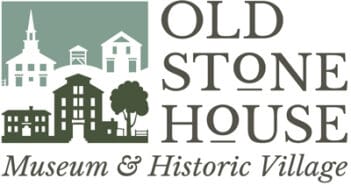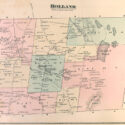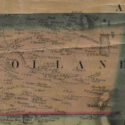Town History
From the Vermont Historical Gazetteer, edited by Abby Maria Hemenway. Orleans County – Holland Chapter: By Mrs. Geo. A. Hinman. Published by Claremont Manufacturing Co, 1877. Pgs 231-233, 236.
This township is situated in the N. E. corner of Orleans County; bounded N. by the towns of Stanstead and Barnston, in Canada, and lies just south of the 45th deg. N. lat., and extends 7 miles, 13 chains, on Canada line, and 5 miles, 7 chains from north to south lines; and is bounded E. by Norton in Essex County, S. by Morgan, and W. by Derby; and lies in the calcareo-mica slate region of Orleans County, though a bed of gneiss extends through the central part of the town, north and south, of about a half a mile in width.
The soil is very retentive, and excellent for grass, and all the cereal grains. It is probable the average yield of hay, wheat, and oats per acre, is, at present, greater in the town of Holland than in any other town in the County, notwithstanding the fact that much of all these products have been carried to other towns every year, and soil thus impoverished.
The surface of the township is diversified by considerable elevations, and it lies on the slope of land on the east of Lake Memphremagog, the eastern boundary being properly the eastern ridge of the Green Mountains- though there is no elevation bearing the name of mountain, except Mount John, in the S. E. part of this town. Neither is the surface at all broken, but the highest hills are susceptible of cultivation, and their soil as good as any in town. There are several small ponds in town. One is in the S. W. part, from which rises a stream emptying into Salem pond, after passing through a part of Derby and Morgan. Another branch of Clyde River, in the N. E. part of the town, and about Mount John, emptying into Seymour Lake in Morgan, is called Mad Brook.
But the largest stream of water in town is Barlow River, which runs nearly west from Holland Pond, making, however, a little north, so as to keep most of the way in Canada, till it arrives near Beebe’s Plain in Stanstead, where it turns north and runs into Massawippi Lake. This stream supplies numerous mill-sites all along its course. There are 4 saw-mills in the town of Holland, on this river, all within less than a mile of each other, and chances for more. There are also many mills on it, in Canada. It supplies the water-power of Derby Line Village.
There is also a stream of water rising near the middle of the town, known as Mill brook, which empties into Barlow River before it reaches Derby Line Village. It was upon this stream that the first saw-mill was erected in town, and just above where Paran Huntoon’s mill now stands. There have also been built a grist-mill and starch-factory, at the same place, both of which were destroyed by fire.
The town was chartered, Oct. 26, 1789, to Timothy Andrews and others. The first proprietor’s meeting of which any record can be found, was held at Greensboro, June 8, 1795, at the dwelling-house of Timothy Stanley. Many meetings were held at Derby, till on the 16th of November, following, a meeting was held at the house of Eben Strong, at which it was voted that Col. Benjamin Hinman, Jonathan Gazley, Sheldon Leavitt, Timothy Andrus, William Sabine, Jr., Daniel Holbrook, and Eben Strong, be allowed to pick lots of land, on condition that they each clear off 4 acres a year for five successive years,- they giving a bond of £100 each for the fulfillment of the condition,- one fifth of the bond to be collected for each year of failure, and the first year to end the first day of January 1798, and so on.
The lots picked according to this vote were Nos. 1, 2, 3, and 4 in the first range, by Col. Benjamin Hinman, Jonathan Grazley, and Sheldon Leavitt, respectively; lot No. 6 in the 2nd range, by Eben Strong; lots No. 5 and 7 in the 3rd range, by T. Andrus and W. Sabine; and lot No. 6 in the 5th range, by Daniel Holbrook.
It is worthy of remark, that these picked lots proved no better than other portions of the town; and it is not known that the conditions on which they were picked, were ever complied with, or the bonds ever collected. Col. Benjamin Hinman did indeed employ Joseph Cowell to fell 8 acres of trees, in the attempt to fulfill his agreement; but, as they other proprietors neglected theirs, he neglected his also, and the land has not been cleared to this day. It is now covered by a second growth of maples- the other timber having been mostly cut- and forms the best sugar orchard in town. Some 700 trees are tapped on little more than half of it, and the number fit for tapping, still increasing. It is now owned by Joseph Marsh.
The first settlement was made in the year 1800, by Edmund Elliott from New Hampshire, and Joseph Cowell from Connecticut. Mr. Elliott began where Robert Piper now lives, and Mr. Cowell on the lot next west. The next year, 1801, several families settled in town; among them were Eber Robinson, from Connecticut, who took up the lot adjoining Mr. Elliott on the south, and Mr. Jesse Willey, who occupied the lot north of Mr. Elliott, and Mr. Goodenough, who settled on the lot north of Mr. Cowell, since known as the Ferrin place. In the Summer of this year, Adam and Jason Hinman took up lots in the S. W. part of the town; Adam Hinman the place now owned by William Armstrong, and Jason Hinman the one now owned by Isaac Marsh; but they did not permanently reside here till two years later, that is, in 1803. For several years additions were made every year to the number of inhabitants by new settlements.
The first child born in town was Royal, son of Joseph Cowell, born probably in 1801 or 1802. His death also was the first one in town, caused by drinking lye from ashes, when about four years old,- he mistaking it for maple sap. He was buried in the present burying ground, just north of Mr. Robert Piper’s; Mr. Cowell giving the land for a burying-ground, on conditions that the town should fence it, and place stones at the grave of his son. The latter part of the condition has never been fulfilled, and the exactly place of the grave is now probably not known.
There are no very striking adventures known to have happened to the early settlers of Holland. The affairs of the nation had become settled, after the Revolutionary War, before its early settlement, and things went on smoothly as in other places.
The whole country about, being new, however, the early settlers were put to some inconvenience by the depredations of wild beasts. One adventure with a bear happened at the house of Mr. Cowell, in 1804. Mr. Cowell had erected an outer room of logs in connection with his house, which was not completely covered or roofed. Mrs. Cowell was accustomed to keeping cooking utensils, &c., in it. On one occasion, she had left some scraps of tallow there, and a bear climbed over the logs into this room, and devoured them.
Mr. Cowell, thinking his neighbor bruin would be likely to repeat his visit the next night, as he had been so well treated the first time, placed some other eatables in the same room for him, and procured some of his neighbors to watch for his bearship’s appearance. Sometime in the latter part of the night he again entered the room, and commenced his repast. The watchers now appeared at the door, and one of them snapped his gun at his dark-haired neighbor. He, no doubt thinking mischief was meant, climbed out over the logs, as he came in, while another of the party ran round to that side of the room, with an ax, to stop him; but, not arriving in person for that, he ran along side of him to a log-fence, two or three rods distant. Here as bruin made no disposition to stop, and cultivate acquaintance, but mounted the fence, preparatory to an exit on the other side, he dealt him a blow with his ax, so lustily, in his side, that it slipped from his hand, and bruin walked off with it to the woods. Thus far, the bear appeared to have the advantage. Mr. Cowell lost his scraps, &c., and Mr. Wilcox had lost his ax; and neighbor bruin had carried them all off.
The party, reasoning probably, that bruin could have no use for the ax, but would leave it the first favorable opportunity, procured a lantern, and followed him, by the blood he spilled along the way, to the woods, 20 or 30 rods distant, where they found the bear “stone dead;” the ax-handle protruding from his side, and the ax itself in contact with his heart.
The settlements in town gradually increased and things went on smoothly till the breaking out of the war in 1812. The political feeling between the two parties was then very bitter, and caused many to leave town and seek homes elsewhere, which injured, in some degree, the prosperity of the town. About the year 1822, a large family by the name of French and Mead entered town. They were men of considerable means, and gave quite an impetus to business affairs. A little earlier than this, two or three families by the name of Hall moved hither. These were hardy, muscular men, seemingly of iron constitutions, and industrious habits. By constant application they succeeded in amassing quite a competence. But of those that were in their youth when they came, all died in mature manhood, and in one instance the whole family, except a daughter.
The south part of the town was organized first into a school district and remained the same with the exception of some temporary changes, till a few years since, when the eastern part of it was formed into a new district, making the 8th. The 2d district was in the N. E. part of the town; the 3rd between the first two. The next was in the central part of the town, and others were formed as the town was settled. The first school in town was taught by Mrs. Worth, in Mr. Elliot’s [sic] barn.
Although the very first settlers of Holland paid little attention to schools, and some of their children were, at an early day, sent to school in Morgan, yet after the three men, Robinson, Ferrin, and Hinman were settled, as they were, in one district, they set themselves to work zealously and liberally to support a school, each having a large family and feeling the need and value of education. It is believed that few neighborhoods in the State have done more, with equal means, than theirs, for the home education of their children. Three such men are seldom found in one country district; and there were others from time to time to help them; so that few districts have given their children so good advantages as the old south district in Holland, and the result has been that very few country districts have raised up so many intelligent, enterprising, and successful men and women.
A large number of them, as our intelligent youth from every Vermont town have done, have gone out into other parts of the State, and into distant States, and have filled every station of life with honor to themselves, and usefulness to others, and in the successful pursuit of wealth. The impulse given by this first district has also been shared by those since constructed, and a more intelligent, industrious, thriving population is not easily found than the population of Holland; besides, it is undoubtedly one of the best agricultural towns in Orleans County, which is one of the best counties in the State.


